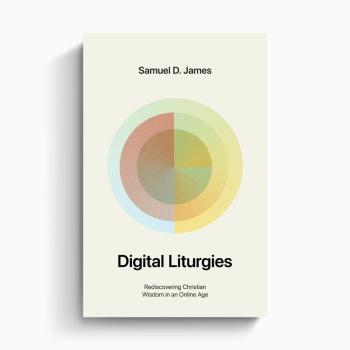Review of Bad Religion by Ross Douthat
By CHRISTIAN HAMAKER
Yes, that’s the Apostle Paul referred to in the title. I can already hear the objections. “No! When religion goes ‘bad,’ turn to Jesus!” “Turn to God!” or even “Turn to the Bible!”

There’s nothing wrong with any of those approaches, except that none of them addresses the problems laid out in Ross Douthat’s recent book, Bad Religion: the paradigm shift that has sent the Christian church into a “bad” period. Douthat builds the case in Bad Religion that the Christian church in 2012 finds itself in a dangerous place. “The United States remains a deeply religious country, and most Americans are still drawing some water from the Christian well,” he writes. “But a growing number are inventing their own versions of what Christianity means, abandoning the nuances of traditional theology in favor of religions that stroke their egos and indulge or even celebrate their worst impulses.” (4)
The author is suggests the answer is, in part, to listen to Paul, and more broadly, to heed the whole counsel of God, not just part of it. That includes stepping back from an unequal emphasis on “the words in red” (the words of Christ, as they appear in many Bibles) to focus on the whole of Scripture—including the maligned writings of the Apostle Paul. For it’s in Paul where we see the words of Christ given application in the early church.
Who’s to blame for this trend toward me-first Christianity? Douthat leaves no Christian constituency unscathed. “These faiths speak from many pulpits,” Douthat claims, “conservative and liberal, political and pop-cultural, traditionally religious and fashionably ‘spiritual’—and many of their preachers call themselves Christian or claim a Christian warrant. But they are increasingly offering distortions of traditional Christianity, not the real thing.” (4)
What is “the real thing”? Douthat, a Catholic who once embraced Reformed theology, speaks highly in “Bad Religion” of both traditions but sees them as infected by a self-esteem culture and politics that use religious language to justify divisive policies, at least here in America.
If a return to traditional Christianity is the answer to our current spiritual problems, how then should we define “traditional Christianity”? Douthat explains that orthodox Christianity is a religion of tension—easy to stray from by tipping too far toward one extreme of the other. When that tension is abandoned, the result can be as extreme as heresy, the goal of which is “to extract from the tensions of the gospel narratives a more consistent, streamlined, and noncontradictory Jesus.” (153)
Which gets to the point of this post. Who knew Jesus best? The apostles. And “chronologically speaking, the Pauline letters are the most historically relevant texts we know of.” (164) Douthat lays out Paul’s theology in a nutshell by quoting 1 Corinthians 15: 1-5:
Now, brothers, I want to remind you of the gospel I preached to you, which you received and on which you have taken your stand. By this gospel you are saved, if you hold firmly to the word I preached to you. Otherwise, you have believed in vain. For what I received I passed on to you as of first importance: that Christ died for our sins according to the Scriptures, that he was buried, that he was raised on the third day according to the Scriptures, and that he appeared to Peter, and then to the Twelve.
Is that message too simple for today? Is it too hard? Why do so many people—so many theologians—sidestep it or reject it in search of something new and different?
Douthat reminds us that challenges to the Gospel truth have been with us as long as the Gospel itself. “From a weary Pontius Pilate asking Jesus ‘what is truth?’ to Saint Paul preaching beside the Athenian altar to an ‘unknown God,’ the Christian gospel originally emerged as a radical alternative in a civilization as rootless and cosmopolitan and relativistic as our own,” Douthat says. But “there may come a moment when the loss of Christianity’s cultural pre-eminence enables believers to recapture some of that original radicalism.” (279)
How can that happen? Perhaps the most refreshing part of Douthat’s historical survey is that he goes beyond recitation and analysis of various schools of theological thought and ends with a call for readers to find a place where they might hear the Gospel faithfully preached, and then to take the time to ponder that truth.
This journey begins “with a single step—over the threshold of your local church, back through the confessional door, or simply into an empty room for a moment’s silent prayer,” Douthat writes. “Even if you do not consider yourself a Christian, chances are that your values and beliefs owe more to Christianity than you think. … There is something to be said for returning to the source, for looking again at your half-forgotten patrimony, for considering anew the possibility that Christianity might be an inheritance rather than a burden.” (293)
He concludes, “You may be disappointed in what you find. But then again you may be joyfully surprised. And just as importantly, your very presence might make a difference to what others find, when they come to look themselves.” (293)












